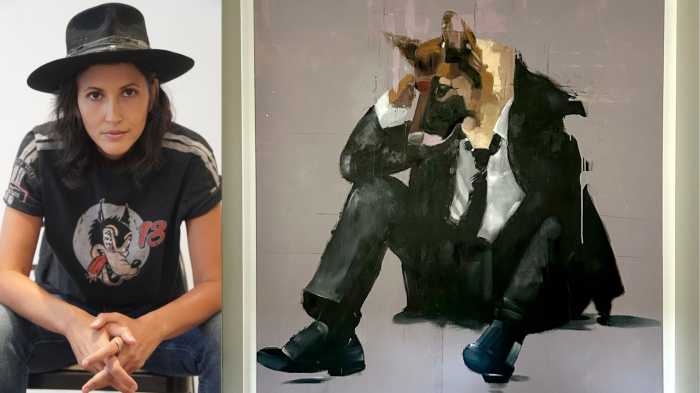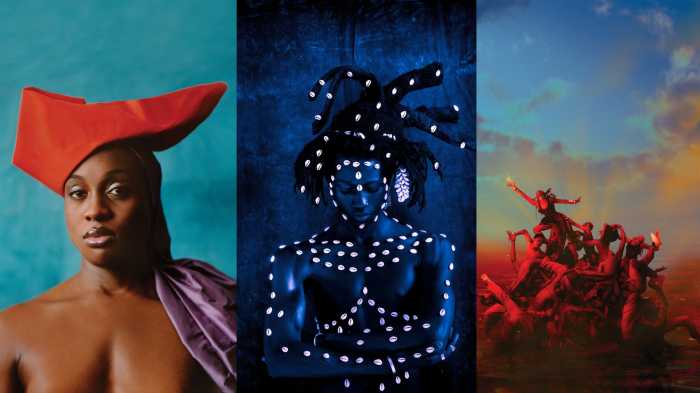By Rachel Breitman
The true stories featured in the book “A Modern Jewish Girl’s Guide To Guilt” are one part Woody Allen, two parts Gloria Steinem, and three parts the Kaballah Center’s Esther (née Madonna). Mixing feminism, neurosis, and frank sexuality, they play on the eternal discrepancy between the writers’ desire to please over-demanding parents and please themselves.
During the first week in October, the novelists, professors, journalists, filmmakers, and religious leaders collected in the book paired up with comedienne Goddess Pearlman and musician Basya Schecter at performances at Joe’s Pub, Mo’ Pitkins, and The Upper West Side Jewish Community Center. They kvelled about their parents’ boundless desires for grandchildren, the pressure to find Jewish spouses, and their own goals of personal success, familial acceptance, and great sex.
The reading series includes upcoming appearances in Ohio, California, New Jersey, and Arizona before it returns to New York on November 10th, for a performance at Makor. Though the groups will appear in bookstores, bars, synagogues and Jewish cultural centers throughout the country, their schtick is pure New York, with references to Zabars, Ramaz, and competition over New York Times Styles Section wedding announcements.
Still, the compilation’s editor, Ruthie Ellison, said she tried to include a wide variety of contributors to show the broad range of voices within the Jewish community.
“I tried to go for religious experience diversity, not just white Upper West Side women,” said Ellison, a freelance writer living in Los Angeles who frequently appears in The LA Times and People Magazine. “There are Iranian Jews, Black Jewish women, Orthodox and others.”
Ellison herself was the child of a rabbi and a woman who had converted to Judaism.
“In my mid-twenties,” she said, “I thought about how schizophrenic this was. But then every Jewish women I knew experienced a constant push and pull of ‘how much do I owe my cultural identity and religion?’”
Each reader, musician, and performer plays with this duality in one form or another. While many describe a desire to find independence, it is as if they are followed everywhere by Tevye from “Fiddler on the Roof,” humming strains of “Tradition.” Susannah “Goddess” Pearlman, the MC of the reading at Joe’s Pub, appeared in a garish wedding dress right out of a Madonna video, coupled by a t-shirt with the words, “J-date,” the dating website for Jewish singles. At the Mo Pitkins reading, which was hosted by Heeb Magazine, singer Basya Schecter, of the band Pharoah’s Daughter, joined the readers with her musical interlude. One song recast the bible story of Genesis as a humorous tale, suggesting for instance, that the bone from which Eve sprang came not from Adam’s rib, but instead from his penis.
“It’s about doing something you have done in your whole life but it in a new way,” said Schecter, who grew up in Ultra-orthodox households in Borough Park and Muncie. “You can’t undermine all your indoctrination, but there is a place where you can kind of take a bit of a turn.”
Filmmaker Pearl Gluck, whose documentary “Divan” tells about “slipping” from her Hasidic upbringing, wrote about her struggle to hold on to her own religious history and intense faith while attending college, receiving a Fulbright, and becoming a successful filmmaker. Though her personal achievements were impressive, they stood in stark contrast to the future that her father had hoped for her, as a wife and mother living in a traditional Hasidic family in Borough Park.
“My perspective is that I don’t really think I pulled away,” said Gluck. “My religious history actually fuels all my work.”
In her memoir “Expecting” included in the book, Rebecca Walker—author of the book “Black, White and Jewish: Autobiography of a Shifting Self” — chronicled her indecision between naming her son Tenzin, after the Dalai Lama, and appeasing her father’s desire for a grandchild with a proper biblical name. In her diary-entry style piece, Walker, the daughter of African American author Alice Walker and a Jewish father, considers, “Maybe guilt is the mechanism that holds us all together and keeps us from completely spinning out into non-Jewhood.”
The book ends with a piece by Susan Shapiro, a writing teacher at NYU and The New School. Shapiro will also join her fellow contributors in one of the upcoming readings in Los Angeles. Her culminating story “Quitting Guilt,” boldly declares her pride at abandoning anxiety and shame. She triumphantly describes forgoing guilt-laden family events, business trips, and birthday parties in order to complete personal goals, including publishing three nonfiction books, and quitting cigarettes, alcohol, drugs, gum, and bread.
“Though mine is the last one, I think every single one is actually about quitting guilt,” said Shapiro, who wrote two memoirs of her own entitled “Five Men Who Broke My Heart” and “Lighting Up: How I Stopped Smoking, Drinking and Everything Else I Loved in Life Except For Sex.” “Each one seems to say the same thing: I am not buying into this role.”
Contributors Elisa Albert, Jennifer Bleyer, Lauren Grodstein, Dara Horn, Molly Jong-Fast, Amy Klein, Laurie Gwen Shapiro, Sheryl Zohn and Ruth Andrew Ellenson will read from the book at Makor, Thursday, November 10 at 7:00 PM. (makor.com)






































